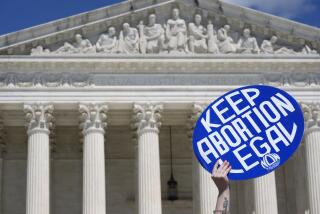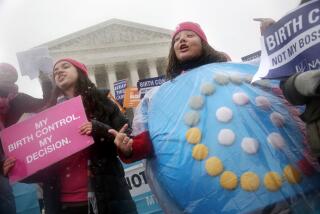Giving Youths Contraceptives Urged : U.S. Panel Also Backs Abortion as Option for Teen-Agers
- Share via
WASHINGTON — The National Research Council, in a controversial report, Tuesday recommended that teen-agers’ use of contraceptives be increased and cited abortion as a legal option to help reduce the problem of more than 1 million teen-age pregnancies each year.
In its report, the panel of 15 physicians, social scientists and public health experts urged governments and schools to assign the “highest priority” to preventing such pregnancies.
“Making contraceptive methods available and accessible to those who are sexually active and encouraging diligent use of these methods is the surest strategy for pregnancy prevention,” the report said.
Although the issue of teen-age sex may arouse “many deep-seated emotions and convictions,” the council said, aggressive action is needed to cope with a problem that is not responding to current efforts.
Clinics, Schools Cited
The council recommended, among other things, more extensive sex education for young people and the dispensing of “contraceptive services” through schools and community clinics.
The 337-page report was the result of a two-year study conducted by the council, which is a research arm of the prestigious National Academy of Sciences.
It drew both praise and criticism from the education and public health fields.
Faye Wattleton, president of Planned Parenthood of America, said that she was “very pleased” with the report and believed it suggested reasonable measures for combatting a serious problem.
Education Secretary William J. Bennett disagreed, however. He called the development of school-based birth control clinics a “dumb policy” and said it would “damage our schools and children. I’m sure this group had good intentions. I just wish it had more wisdom and common sense.”
And John C. Willke, president of the National Right to Life Committee, said the report “totally ignores the primary victim of every abortion--the unborn child.”
‘Intended to Be Balanced’
One member of the research panel, Frank F. Furstenberg Jr. of the University of Pennsylvania’s Department of Sociology, said: “I think there are certainly some people in the Administration that are going to find this report more than they can swallow. There will be others that will be very sympathetic to the message of the report, which is intended to be well balanced and to consider the problem in the broadest sense.”
The study found that 64% of boys and 44% of girls are sexually active by the time they are 18. About 470,000 teen-agers give birth each year, and about 400,000 other girls have abortions. The per capita rate of teen-age pregnancy is considerably higher in the United States than in other industrial countries, the report added.
The panel said that it found no convincing evidence that providing teen-agers with contraceptives encourages early sexual activity.
It called birth control pills “the safest and most effective means of birth control for sexually active adolescents” and recommended wide distribution of condoms, especially in places where teen-age boys congregate.
Endorses ‘the Pill’
It did not specifically recommend that schools dispense contraceptive products, although it noted that some experimental school clinics are doing so.
“We think the pill use for sexually active children is a safe and effective method that has been overly maligned by some of the early research done on the pill,” Furstenberg said. “Many teens and their families have undue concerns about the safety of the pill.”
All counseling of young people on methods of contraception should be complemented by strong advice against having sex, the panel said.
Alternatives to Motherhood
For girls who become pregnant and are unable to raise a child, the report said, two options should be presented and considered: abortion and adoption.
It said there is no evidence that teen-agers cannot make well-reasoned decisions on whether to terminate pregnancies. They should be encouraged to consult their parents about such a decision, it said, but parental consent should not be mandatory.
The report recommended that teen-age fathers assume more responsibility for child support and suggested experiments that would legally link child support awards with job training and work opportunities.
“Society must avoid treating adolescent sexuality as a problem peculiar to teen-age girls,” the report said.
More to Read
Sign up for Essential California
The most important California stories and recommendations in your inbox every morning.
You may occasionally receive promotional content from the Los Angeles Times.













